A border town of the pre-Incan Huari empire woven diplomatic relations with neighboring peoples by organizing festivals based on chicha, a fermented beverage made from local berries. Alcohol production could continue unaltered during periods of drought and economic crisis.

Topics covered
A Peruvian people of the past had its own way of establishing diplomatic relations with neighbouring peoples. These were the so-called Huari, who used to organize beer festivals!
The Role of Beer for the Peruvian People
Studies of the remains of a microbrewery active until a thousand years ago have provided archaeologists with new details about the Huari‘s political skills.
This civilization flourished in the Andes from 600 to 1050 AD.
Cerro Baúl was the southernmost outpost of this pre-Inca empire. This city was on top of a plateau far from natural water reserves, close to the rival state of Tiwanaku.
Here, people used to hold banquets with the Tiwanaku and other nearby populations. In front of llama steaks and pints of chicha, a kind of sour beer, political leaders settled disputes before they degenerated into violent clashes.
In a new study published in Sustainability, archaeologists at the Field Museum in Chicago analyzed fragments of ancient chicha containers. They were able to figure out where the ingredients for beer came from, as well as the pots used for fermentation. The chicha that still comes from fermenting corn or fruit today can only be stored for a week. This means that Peruvian people couldn’t export it. Consequently, those who wanted to taste it in industrial production had to reach Cerro Baúl.
The End of Peruvian People Tradition
In the new study, archaeologists have analyzed the remains of shards emerging from an old microbrewery, a factory that supplied the nearby taverns in Cerro Baúl. This chicha factory was destroyed and burned down 950 years ago, just before the Huari left the city. The inhabitants of Cerro Baúl had already destroyed temples and palaces and left the brewery for last. By cancelling it, they abandoned their containers there along with votive offerings. It was a final act of respect for a social institution.
Local Ingredients
Chemical analysis of the ceramics revealed that the Huari used local materials for brewing. In particular, they used local clays to build containers for storage. But most importantly, they produced the chicha through the fermentation of pepper berries. This is interesting because this indigenous product grew even in times of drought. Huari beer was therefore immune to periods of commercial crisis and climatic instability. In short, in lean times, you could always drink it. For researchers, this is further proof of the role of this drink as a political cement holding.




